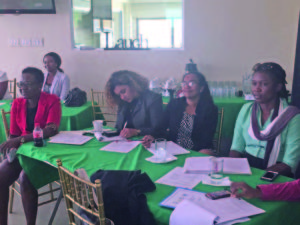Government’s Green State Development Strategy (GSDS) draft framework could be approved in a matter of months.
This will pave the way for a final policy document that will guide the country’s plans for the environment, its eco-system, and how this will tie into the social and economic development of the country. Environmental Consultant to Go

vernment, Andrew Bishop, made this disclosure at a workshop held by the Environment Department on Monday at Parc Renaye. The focus there was primarily on the RIO Mainstreaming Project, which is aimed at sensitizing media operatives on the Rio conventions.
Bishop told workshop participants that the framework of the GSDS includes key provisions in the energy and forestry sectors that would control emissions. He said, too, that the Climate Resiliency and Strategy Action Plan is still being reviewed, to ensure it is aligned with national plans.
The former Commissioner of the Guyana Lands and Surveys Commission (GL&SC) also told media practitioners that Guyana’s reporting obligations to the United Nations Framework Convention on Climate Change (UNCCC) in the forestry sector, inventory of greenhouse gases, is ongoing.
Bishop said the ultimate goal is to mainstream the conventions with national processes, starting with a National Forest Plan, since it cross-cuts all the conventions.
Stakeholder Management Coordinator of the Department of Environment, Aretha Forde, in her remarks, stressed the importance of the GSDS to the national development trajectory.
“It (GSDS) is intended to help Guyana achieve a green economy. So the green economy is the destination and the GSDS is how we will get there,” she told media professionals.
It was noted that there are public misconceptions about the strategy. However, it was also noted that Guyana currently has a GSDS framework document. Regional consultations will help to guide the formulation of a sound policy, but not without the input of citizens and other stakeholders.
Patsy Ross, a Multilateral Environmental Agreements Specialist with over 20 years’ experience, was one of the presenters at the workshop. She spoke about issues relating to the UNCBD.
She said lands are being degraded globally, and the estimated economic cost is now billions of dollars each year. Based on this, it is estimated that there will be a demand for energy, food, water and other things by 2030.
“What is so important about the land? Land degradation affects fibre, fuel, nutrients cycling, carbon sync, regulating climate services, recreation, and eco-tourism among others,” Ross told the workshop.
The environmental specialist said deforestation in mining and agriculture are drivers of land degradation in Guyana; therefore, there is a need for these plans to align to livelihoods and sustainable development.
“There is also a reporting requirement on what has been done to address land degradation,” she added. Guyana is reportedly one of the first countries to volunteer to establish a programme to address this issue.
The GSDS comprises seven thematic areas, such as: sustainable management of the environment, renewable energy, resilient infrastructure, human health and well-being and governance.
The three conventions are: the United Nations Framework Convention on Climate Change (UNFCCC), ratified August 29, 1994, the focal point agency of which is the Office of Climate Change (OCC); the United Nations Convention on Biological Diversity (UNCBD), ratified on the same date, the focal point agency of which is the Environmental Protection Agency (EPA); and the United Nations Conventions to Combat Desertification (UNCCD), which was ratified on June 26, 1997, the focal point agency of which is the Guyana Lands and Surveys Commission (GLSC).
As a means of getting the local press corps to cover more environmental issues, the workshop was hosted on Monday by the Department of Environment (DoE) in collaboration with the United Nations Development Programme/Global Environmental Facility (UNDP/GEF).
The aim of the workshop was to improve public awareness on issues relating to the environment, especially in the area of climate change, land degradation, and water preservation, among others. It also focused on increasing awareness and understanding of the Rio Conventions on climate change.
The workshop formed part of an implementing project titled, “Strengthening technical capacities to mainstream and monitor Rio Convention implementation through policy coordination.”



